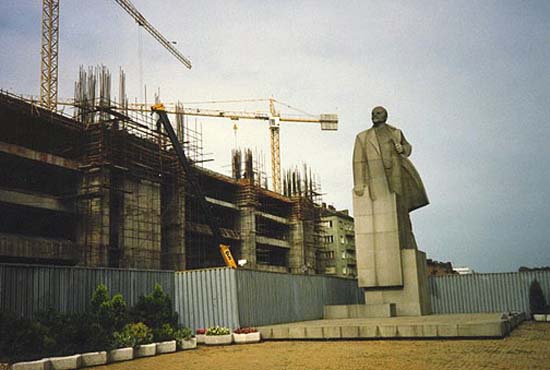
Peace Corps - Braving Minor Hardships in Burgeoning Bulgaria
Peace Corps - Braving Minor Hardships in Burgeoning Bulgaria
LIFE IN THE PEACE CORPS:
Braving Minor Hardships in Burgeoning Bulgaria
by Eric Friedman.
Recently I was fortunate enough to be invited to Amsterdam for the holidays, where a relative of my host, upon learning I was spending two years in Bulgaria working for the U.S. Peace Corps, said, “That’s a long time to be buried somewhere.”
I replied that I didn’t quite look at it that way, and upon reflection I wonder if the truth about the experience isn’t completely the opposite; Bulgaria, in the decade since the fall of communism in Eastern Europe, is being reborn.
As an American volunteer in Bulgaria it’s hard not to feel like I’m being born along with it. I have more freedom and responsibility than ever before. In addition to teaching English to eager middle school students, I have started a student newspaper and begun teaching kids how to play baseball and American football. I’ve also opened some students’ eyes to the internet, where in the absence of guidance counselors at school they can search for ways to further their studies.
In return I am often invited to participate in and enjoy the fruits of the traditional culture. I’m living in the town of Simitli, a small farming community about two hours south of the capital, Sofia. The people grow most of their own food, from fruits and vegetables to livestock. I have helped pick grapes in the vineyards outside town, made butter, made wine, and witnessed the killings of two pigs.
Of course, what is interesting to me is an indispensable way of life to Bulgarians. Their self-sufficiency--the fact that they grow their food and own their houses (which often they’ve built for themselves)--has largely maintained the country’s stability through the severe economic crises of the past decade.
Historically, Bulgaria has been dominated by foreign powers (the Soviet Union in the 20th century, the Ottoman Empire in the preceding centuries). Thus there is a deep-rooted tradition of cooperative existence, which predates the communist era. Along with that, however, and perhaps what was exacerbated under communism, is the undertone of apathy and pessimism among Bulgarians.
This sentiment persists today with the rampant corruption in the economy and in politics. If Americans are instilled with a “can-do” spirit on account of their privileged environment, Bulgarians often settle for a “make-do” mantra. Once a week or so our town doesn’t have water during the day, and yet no one seems too concerned about knowing why. When the school’s copy machine runs out of toner, lack of money means it is no longer an option.
But these are really minor hardships, and I only mention them as examples of things (water, toner) that I took for granted in the U.S.; in Bulgaria, disruptions in such things seem to be taken for granted as well. It is the inconveniences that have made me appreciate more fully the value and pleasures of communication and exchange which exist above and beyond any hardship.
Travelling is difficult through mountains on old buses, and phones often disconnect in the middle of a conversation. But those adversities have made me and my fellow volunteers that much more active in visiting and supporting each other--writing letters and making birthday cakes with improvised ingredients. And with Bulgarians we overcome the (slowly diminishing) language barrier by trying a little harder to show friendliness and understanding. The Bulgarians make it easy for us with their hospitality and general willingness to share their culture.
Of course they are equally excited about all things American; their radio, television and cinema are dominated by American pop culture. It’s hard to watch kids who usually organize their own soccer matches start to flock to the new computer game rooms. It’s shocking to find McDonald’s to be considered an expensive treat.
One time I was disturbed when a musical jam session with some Bulgarian teachers was broken up because they had to go see the new Wesley Snipes movie at the cinema.
The love for American culture is indiscriminate, which is not only unwarranted but is also, I think, a rather empty worship that will not serve this developing country. This is the global pattern, it seems, of “emerging markets,” where the availability of Coca-Cola and fast food are supposed to be signs of progress.
Already in the cities and larger towns in Bulgaria, people no longer produce their own food. Supermarkets are coming into being. Pretty soon there will be Bulgarians like me who had no idea where butter came from.
I’m worried that what will be compromised is the self-sufficiency and social fabric of the small community, where people see everyone they know in town on the street or waiting for the bus, walking to work or in the cafes at night. Where the cows come home from the hills after sundown, and the roosters crow at all hours of the day. Where life is lived more truly and directly, not filtered through “time-saving” and distancing technology.
At least that’s how I feel about it. I certainly do not feel suffocated here... If ever I was “buried” somewhere, it was when I was working in a cubicle in New York City. In Bulgaria I wake to the sun rising over the mountains, to students shouting hello as I walk to work, and to a country that is trying to reconcile itself with western values.
Watching and playing a small part in that process is most interesting and rewarding, and there is no other place I’d rather be.
Eric Friedman, a graduate of The Johns Hopkins University, was an intern with this newspaper about five years ago. He went on to work in magazine publishing before joining the Peace Corps. He welcomes letters; write him c/o Peace Corps, P.O. Box 259, Sofia 1000, BULGARIA.
Updated by Allegro Web Communications on February 2, 2000.
